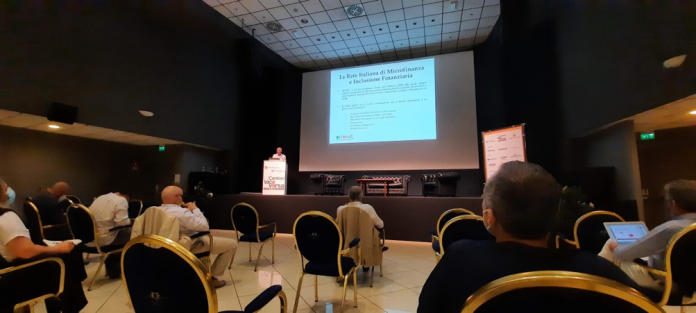In July 2021, Microfinanza and the Italian Microfinance (and Financial Inclusion) Network (RITMI) had the chance to take part in the first panel in the “Cantieri ViceVersa Summer School 2021”, implemented by “Forum per la Finanza Sostenibile” (Forum for Sustainable Finance) and “Forum Terzo Settore” Forum for the Third Sector), organized from July the 8th-10th at the Palace Hotel, in San Marino: three days of discussions, in-depth analyses, debates and dialogues between representatives of the world of financial supply and demand for the third sector.
During the three days, representatives of financial institutions and insurance corporations (such as Banca Etica, Itas Mutua, Intesa San Paolo, Unicredit, Emilbanca and others), foundations (Associazione di Fondazioni e di Casse di Risparmio, Fondazione Con il Sud and others), private and public entities (such as Nuvolab, CGM Finance, AICS), universities and research centres (such as the Sapienza University of Rome and the Politecnico di Milano), and networks (such as RITMI and Cooperfidi Italia).
6 sessions have been organized, and have focused on different topics, such as “access to credit and guarantees”; “Financial instruments for international cooperation”; “Insurance instruments”; “Impact credit”; “Equity and investment funds”; and “Donation tools”.
Mr. Giampietro Pizzo, president of Microfinanza and RITMI, had the opportunity to speak during the first panel, and to give some details about the situation of microfinance and financial inclusion in Italy, the access to credit, notably for vulnerable categories, and the importance of financial resources and non-financial services, especially in times of COVID-19.
The staff of Microfinanza participated to 2 roundtables, in which the YES project has been presented, together with the main services (training, coaching and mentoring) dedicated to NEETs, and the main challenges faced during the implementation of the project.It was a great opportunity to promote the initiative and seek support for its scaling, but also discuss with other private and public entities which operate in the same field, such as Invitalia, the National Development Agency of the Italian Ministry of the Economy, which manages several actions (such as SELFIEmployment project, and Resto al Sud) to support small entrepreneurial projects, promoted by NEETs. What came out in an evident way, that the allocation of financial resources to support the start up of new entrepreneurial project is a necessary but not sufficient condition: it is key to provide ancillary and auxiliary (non-financial) services and appropriate tools to guide and orient beneficiaries to considered and informed choices, and finally, to have an effective and positive impact to NEETs.


